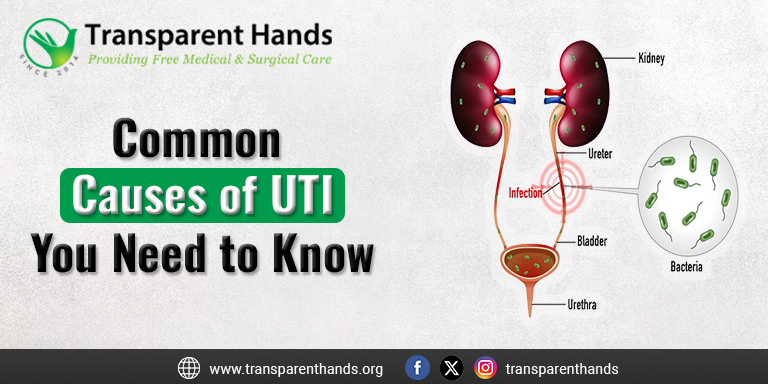Common Causes of UTIs You Need to Know

Urinary tract infections (UTIs) affect millions of people worldwide, and can cause over 200,000 deaths in a year. Research has revealed that women are more likely to suffer from UTIs compared to men, and 40% of females are likely to experience a UTI at least once within their lifespan. Even though UTIs are among the most common health problems, many people lack awareness about their causes. To expand your understanding, this article covers the symptoms, common causes, and frequently asked questions about UTIs.
How UTIs Affect the Urinary System
The urinary system is an essential component of your body, and key parts like kidneys, ureters, urinary bladder and urethra are included in this complex system. The main goal of this entire system is to filter the bloodstream, and urine is produced as a waste substance. However, the balance of the urinary system can be affected if it succumbs to infections which are generally known as urinary tract infections or UTIs for short. If UTIs are not dealt with in a timely manner, they can lead to discomfort and may even sprout other serious health-related issues.
Top Causes of UTI
Here are some of the most common causes of UTI in the population:
Bacterial Infections
Bacteria live in the intestinal regions of both humans and animals. The most common of these is named Escherichia coli, better known as E. coli, which is the culprit behind most UTI cases. It travels up the bladder via the urethra due to some sort of contamination and multiplies causing the infection.
Contamination may occur due to improper wiping after using the toilet or sexual activity, making it one of the most common causes of UTI in males as well as females.
Infections from Other Germs
Infections induced by fungi, viruses, and parasites can also trigger complex urinary tract infections (UTIs). In a few cases, bacteria like Candida and Coccidioides disrupt the equilibrium of microorganisms in the human body by targeting and attacking specific people with compromised immune systems, leading to UTIs.
Some parasites like threadworms and flukes, and viruses such as HSV-2 (herpes simplex virus type 2), are also rare causes of UTIs.
Constipation
Constipation can be a huge risk factor for UTIs due to the pressure it puts on the bladder, resulting in urinary retention. Stool buildup can compress the bladder, not allowing it to empty completely meaning that bacteria will thrive.
Dehydration
Dehydration causes one to not have enough fluid to pass, creating an ideal environment for bacteria build-up. The risk of developing a UTI increases in this case, especially during hot weather conditions.
Not Emptying The Bladder
Holding in your urine can cause bacteria to multiply which may then cause an infection. Also, the bladder wall muscles receive strain over time and passing urine can become a difficulty.
Other Risk Factors
The following factors can also increase the risk of contracting a UTI: sexual activity, old age, lack of hygiene, and pregnancy.
What Are the Symptoms of a UTI?
Some common indications that a lower UTI might be present include pain or a burning sensation in the urinary passage. This is mostly felt during urination and you may also feel the need to urinate more frequently, especially at night or suddenly with more urgency than usual.
There might be an appearance of cloudy and strong-smelling urine, which can be tinged with blood. It can also cause constant discomfort and irritation.
As for the more complicated Upper UTIs, high temperature and back pains along with sickness and nausea are symptoms that indicate a more serious problem that should be dealt with immediately.
Why Do My UTI Symptoms Come and Go?
The most frequent reason behind recurrent UTI symptoms is incomplete recovery. Failing to finish your antibiotic course upon early signs of recovery or getting improper treatment can lead the bacteria to persist causing the symptoms of UTI to reoccur.
Moreover, hormonal changes like menopause in women and underlying health conditions such as diabetes and a weakened immune system can make it possible to contract the infection again through the same or a different bacteria.
How to Relieve UTI Symptoms?
Although discomfort while suffering from a UTI can be expected, there are certain measures you can take to find relief. Drink a lot of water and urinate frequently to get rid of the bacteria.
Avoiding caffeine and alcohol or acidic drinks will prevent irritation in the bladder, and using a heating pad definitely helps one cope with the pain. A word of caution, however; the steps mentioned will not remove the infection and cure it completely. But it can ease the journey of recovery as long as you seek appropriate medical aid.
How Long Does It Take for UTI Symptoms to Appear?
Visible signs generally make themselves apparent within three to seven days after being infected. However, based on the type of infection you contracted, your symptoms may appear sooner or later. Hence early detection and adoption of recovery measures are crucial for not allowing the infection to spread and doing more damage.
Causes of UTI in Females
Women are more likely to develop UTIs than men because of the short length of their urethra which allows germs to pass and easily reach the bladder.
In addition, sexual activities may also introduce these bacteria into the urinary tract and thereby raise the chances of getting infected. Other causes of UTI in females include hormonal changes such as menopause, menstrual cycles, and weakening of the bladder tissues with growing age. UTI symptoms while pregnant can cause further discomfort for women, making it all the more important to seek treatment as soon as possible.
How Long Do UTI Symptoms Last?
If you are regular in your treatment, then the symptoms will start decreasing within 3-5 days of medication. However, neglecting the course of treatment may prolong the infection.
How is Transparent Hands Preventing UTIs?
Transparent Hands’ medical team has been raising awareness about UTIs by holding preventive healthcare sessions at our free medical camps across Pakistan. Numerous attendees, including a large number of women, benefit from our preventive healthcare sessions and join the fight against this common infection. In addition, our medical team provides free consultations and distributes medicines for UTIs free of charge among deserving patients.
Conclusion
Dealing with UTIs can be uncomfortable but they can be avoided. Drinking plenty of water, keeping yourself clean and dry, using safe sexual practices, and seeking medical attention when appropriate can all help to reduce your chance of getting such infections. Join hands with us to fight some of the common infectious diseases in Pakistan. Explore our upcoming free medical camps and preventive healthcare sessions. Play your part now.











Leave Your Comments